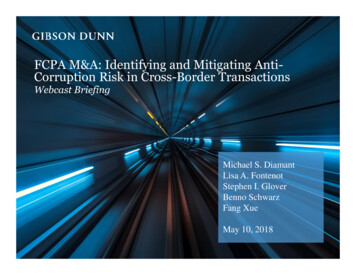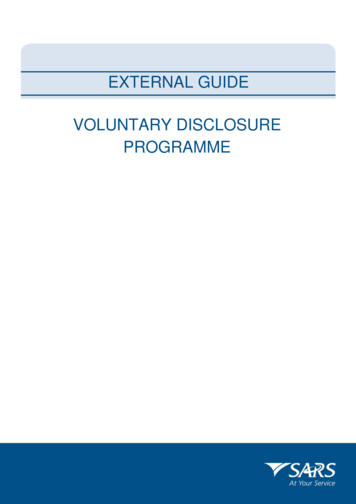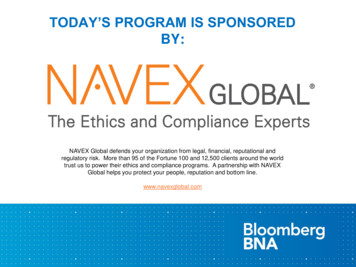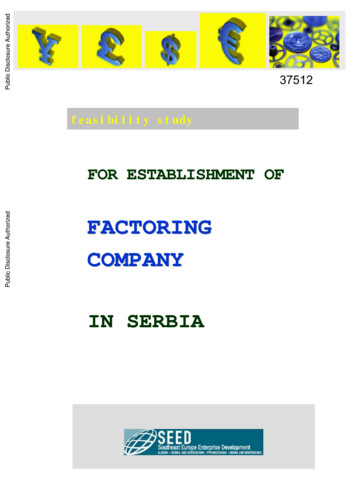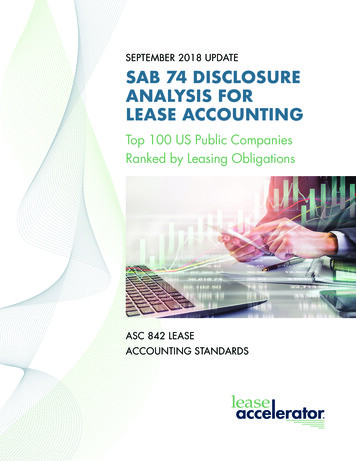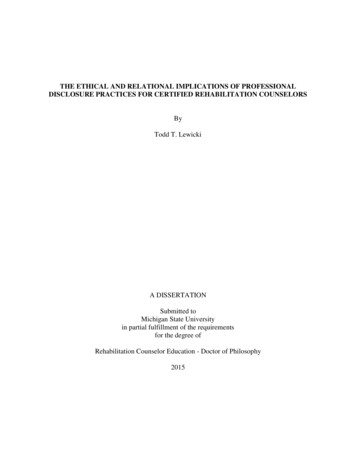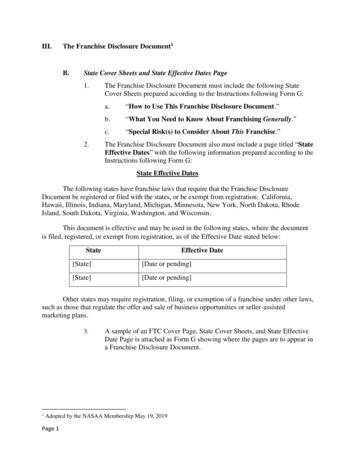
Transcription
Presenting a live 90-minute webinar with interactive Q&AFCPA Voluntary Disclosure:Determining Whether and When to Self-ReportWeighing the Options, Understanding the Risks and Rewards, and Minimizing PenaltiesWEDNESDAY, OCTOBER 29, 20141pm Eastern 12pm Central 11am Mountain 10am PacificToday’s faculty features:Edward J. Fishman, Partner, K&L Gates, Washington, D.C.Kimberly A. Parker, Partner, WilmerHale, Washington, D.C.James G. Tillen, Member, Miller & Chevalier, Washington, D.C.The audio portion of the conference may be accessed via the telephone or by using your computer'sspeakers. Please refer to the instructions emailed to registrants for additional information. If youhave any questions, please contact Customer Service at 1-800-926-7926 ext. 10.
FOR LIVE EVENT ONLYSound QualityIf you are listening via your computer speakers, please note that the qualityof your sound will vary depending on the speed and quality of your internetconnection.If the sound quality is not satisfactory, you may listen via the phone: dial1-866-570-7602 and enter your PIN when prompted. Otherwise, pleasesend us a chat or e-mail sound@straffordpub.com immediately so we canaddress the problem.If you dialed in and have any difficulties during the call, press *0 for assistance.Viewing QualityTo maximize your screen, press the F11 key on your keyboard. To exit full screen,press the F11 key again.
FOR LIVE EVENT ONLYFor CLE purposes, please let us know how many people are listening at yourlocation by completing each of the following steps: In the chat box, type (1) your company name and (2) the number ofattendees at your location Click the SEND button beside the boxIf you have purchased Strafford CLE processing services, you must confirm yourparticipation by completing and submitting an Official Record of Attendance (CLEForm).You may obtain your CLE form by going to the program page and selecting theappropriate form in the PROGRAM MATERIALS box at the top right corner.If you'd like to purchase CLE credit processing, it is available for a fee. Foradditional information about CLE credit processing, go to our website or call us at1-800-926-7926 ext. 35.
FOR LIVE EVENT ONLYIf you have not printed the conference materials for this program, pleasecomplete the following steps: Click on the symbol next to “Conference Materials” in the middle of the lefthand column on your screen. Click on the tab labeled “Handouts” that appears, and there you will see aPDF of the slides for today's program. Double click on the PDF and a separate page will open. Print the slides by clicking on the printer icon.
Foreign Corrupt Practices Act:Voluntary DisclosuresEd FishmanK&L Gates LLPOctober 29, 2014Copyright 2010 by K&L Gates LLP. All rights reserved.
FCPA Enforcement Trends Historic levels of FCPA enforcement continue againstcompanies and individuals Courts have upheld the broad definition of a “foreigngovernment instrumentality” under the FCPA Over 100 companies under investigation More than half of DOJ enforcement actions triggeredby voluntary disclosures Trend of multi-jurisdictional investigations and privatelitigation relating to FCPA issues continues unabated6
Mandatory FCPA Disclosure Considerations Generally self-disclosure of a potential FCPAviolation is not required However, disclosure may be legally required undercertain circumstances Sarbanes-Oxley Act of 2002 may require disclosureof FCPA violations that preclude management fromcertifying the effectiveness of internal controls or thatinvolve fraud7
Mandatory Disclosure Requirements SAB 99’s Qualitative Materiality standard couldrequire disclosure of particularly egregious FCPAviolations Foreign local law could require affirmative disclosure 10A Report from Outside Auditors could require AuditCommittee to disclose potential violations to the SEC8
Cooperation Credit Underpinnings DOJ memos on Prosecution of BusinessOrganizations “Promptly, completely and effectively disclose theexistence of misconduct to the public, to regulators andto self-regulators” SEC: Seaboard Report (October 2001) “Timely and voluntary disclosure of wrongdoing” FCPA Resources Guide DOJ and SEC “place a high premium on selfreporting, along with cooperation and remedialefforts, in determining the appropriate resolution inFCPA matters”9
Cooperation Credit Underpinnings US Sentencing Guidelines Manual 8C2.5(g)(1) (2010)“If an organization (A) prior to the imminent threat ofdisclosure or government investigation; and (B) withina reasonably prompt time after becoming aware of theoffense, reported the offense to appropriate authorities,fully cooperated in the investigation, and clearlydemonstrated recognition and affirmative acceptanceof responsibility for its criminal conduct, [it shallreceive a 5 point reduction in its total culpability score].10
An Overview of theDodd-Frank Whistleblower Rules11
Bounty provisions: overview Require payment of 10 to 30 percent of monetarysanctions obtained To eligible whistleblowers Who voluntarily provide Original information to the SEC about a violation ofthe federal securities laws Leading to enforcement action with sanctionsexceeding 1 million12
Bounty provisions: who is eligible? Almost anyone can be a Dodd-Frank whistleblower Can remain anonymous by reporting through counsel Excluded persons Regulatory and law enforcement personnel Independent public accountants (for information obtainedin the course of an audit) Non-natural persons Lawyers - under most circumstances Compliance personnel - under some circumstances No exclusion for persons involved in misconduct, unlessthey are criminally convicted But no amnesty for whistleblowers13
What kind of information must be provided? “Original” information Not previously known to authorities Derived from independent knowledge or analysis of awhistleblower Cannot be derived exclusively from allegation madein judicial hearing, government investigation or fromthe news media Must be provided “voluntarily” i.e., before company’s receipt of a request from theSEC or other authorities14
What information does not qualify for a bounty? Excluded information - information obtained by: Attorneys in the course of representation Unless “up the ladder” or ethics exception applies Compliance personnel Unless company doesn’t self-report within 120 days, or“reasonable basis to believe” that disclosure isnecessary to prevent substantial injury to company orshareholders Whistleblower is eligible even if information wasobtained in violation of: Privileges other than attorney-client Civil law Criminal law (unless convicted of violation)15
Dodd-Frank: protection against retaliation Employer may not discharge, demote, threaten ordiscriminate against whistleblower Whistleblower has federal right of action to enforcethis provision Remedies include: Reinstatement 2 x back pay Costs16
Key Issues and Risks17
Tension with Corporate Compliance Efforts No requirement that employees first report concernsinternally SEC rule seeks to “not discourage” employees from firstreporting to the company SEC “may” (but need not) consider higher percentageawards for those who first report internally Internal investigations Company personnel who learn of an issue by beingquestioned in an internal review can qualify for bounty Compliance personnel become eligible for bounties wherecompany fails to report to SEC within 120 days18
Effect on “self-reporting” decisions Only the first person to report information will beeligible for a bounty Companies may seek to report first to obtaincooperation credit Changing the calculus of the self-reporting decision Greater chance that violations will come to SECattention Greater risk that whistleblower will report before thecompany does19
Proactive Steps20
Encourage internal reporting Efforts to ensure that the company will be the first toknow of potential wrongdoing Promote the expectation that the company wants toknow about potential wrongdoing Implement effective internal reporting procedures Require internal reporting Enhance the credibility of internal reporting Promptly investigate legitimate reports Take appropriate remedial actions Do not tolerate retaliation in any form21
Enhance corporate compliance systems More proactive / less passive Risk assessments Active monitoring of compliance Retrospective auditing of compliance22
Reduce the risk of retaliation claims Limit the number of individuals aware of theidentities of whistleblowers Do not seek to identify anonymous whistleblowers Provide training for managers at all levels Adhere to best practices for employee evaluations Document fully and accurately Review performance honestly and timely Exercise extra caution with employees who mayuse whistleblowing as an offensive strategy23
Be prepared to respond to SEC Enforcement SEC Enforcement Staff may contact companiesabout whistleblower reports May offer companies the opportunity toinvestigate and report back Significant advantages in cost and control Staff will need to be confident that company willcooperate and conduct credible inquiry Advance planning can position company to makean appropriate response24
Contact InformationEdward J. FishmanK&L Gates LLP1601 K Street, N.W.Washington, D.C. 20006Phone: 202-778-9456Fax: 202-778-9100E-mail: ed.fishman@klgates.com25
Foreign Corrupt Practices ActVoluntary Disclosures:Factors Relevant to Whether toSelf-DiscloseKimberly A. ParkerPartnerWilmer Cutler Pickering Hale and Dorr LLPOctober 29, 2014
Voluntary Disclosure – Overview FCPA statute does not require self-reporting Generally no obligation to self-report FCPA violations Exception if the company is operating under prior legalagreement with the government that requires disclosure SEC public disclosure rules may become relevantBoth DOJ and SEC strongly encourage self-reporting DOJ/SEC FCPA Resource Guide (November 2012):“Both DOJ and SEC place a high premium on selfreporting, along with cooperation and remedial efforts, indetermining the appropriate FCPA resolution.”“Carrot and stick” approach Carrot: leniency/“credit” Stick: threat of harsher treatment if conduct is revealedwithout a self-reportWilmerHale27
Voluntary Disclosure – Overview DOJ/SEC accept that some cases are not seriousenough to warrant self-reporting: Charles Cain, Deputy Chief, SEC FCPA Unit(2013): “If a company has a relatively smallproblem within an otherwise robust complianceenvironment, I would be surprised to hear about it.The further you get from that, the more I’d expect.” Assistant Attorney General Alice S. Fisher (2007):companies should voluntarily disclose “seriousFCPA issues” Mark Mendelsohn, head of DOJ FCPA Unit (2007):“[t]here are only so many hours in the day, and Iwould like to sleep some of them”WilmerHale28
Voluntary Disclosure – Relevant FactorsCompanies consider a mix of practical factors: Factor 1: Is the matter likely to come to the attention ofDOJ/SEC in some other way? If so, then report promptly; no downside andpossible upside Relevance of Dodd-Frank whistleblower law How likely are investigations by law enforcementagencies outside the US?Factor 2: Is the matter serious because it involveslarge sums? Large amounts of questionable payments -- eitherindividually or cumulatively Large amounts of business obtained or retainedWilmerHale29
Voluntary Disclosure – Relevant Factors Factor 3: Is the matter serious because it involvessenior people? Senior corporate officials participated, knew, or lookedthe other way Senior government officials received questionablepayments Factor 4: Is the matter serious because of its scope? Was widespread among business units, or acrossgeography Lasted a long timeFactor 5: Is the matter arguably less serious because itdoes not involve prosecutable acts of bribery and/ordoes not reflect more than an inconsequentialbreakdown or evasion of internal controls?WilmerHale30
Voluntary Disclosure – Relevant Factors Factor 6: Is the matter serious because it involves anon-trivial breakdown in, or failure to implement,internal controls? Did personnel in controllership positions participate,have knowledge, look the other wayFactor 7: Is self-remediation a feasible and sufficientoption? This includes: Stopping questionable conduct Conducting thorough internal investigation, led bycompetent, reasonably independent professionals Addressing compromised controls Disciplining personnel, including where appropriate,more senior executives Correcting erroneous books and records to the extentreasonably feasibleWilmerHale31
Voluntary Disclosure – Relevant Factors Factor 8: Does either government agency havejurisdiction? Involvement of issuer or domestic concern as opposed tojust foreign subsidiary Conduct touching the USFactor 9: Is the company the subject of anotherSEC/DOJ proceeding in which the agency may ask ageneral question the response to which would requiredisclosure of the matter?WilmerHale32
Voluntary Disclosure – Relevant Factors Factor 10: Is the company risk-averse in the sense thatit would rather “play it safe” by self-reporting even wherearguably the balance of other considerations weighsagainst self-reporting?Factor 11: Is self-reporting, even where such reportingis not clearly warranted by other factors, more in keepingwith the company’s corporate culture and its values?WilmerHale33
Voluntary Disclosure – Other Considerations Does the company have or want a particularrelationship with SEC/DOJ? Jason Jones, Assistant Chief of DOJ’s FCPA Unit (2013):Companies can be “serial disclosers” – when certaincompanies build up enough credibility in the eyes ofenforcement agencies, they regularly report issues and arethen given room to handle them on their own, with littleenforcement interference. Does the company have a history of previousviolations?Is company an acquirer trying to avoid inheriting liabilityfrom a target?Is company contemplating an IPO or some other publicmarket transaction?WilmerHale34
Conclusion No one-size-fits-all answer: Specific facts and circumstances must beconsidered in weighing voluntary disclosureChoice is not a self-report or nothing If a company decides not to self-report, it stillshould take significant internal actions,including internal investigation andremediation measuresSignificant credit available even to companies thatdo not self-report if there is meaningfulcooperation and remediationWilmerHale35
Kimberly A. Parker WilmerHale1875 Pennsylvania Avenue NWWashington, DC 20006 USA 1 202 663 6987 (t) 1 202 663 6363 (f)kimberly.parker@wilmerhale.com36
Weighing the Pros and Consof FCPA VoluntaryDisclosuresOctober 29, 2014James G. TillenMiller & Chevalier Chartered
Disclosure vs. Non-DisclosureQuantifying the Benefits Although voluntary self-disclosures are a mitigating factor in theprosecution of FCPA violations that U.S. enforcement authoritieshave promised will bring “real benefits,” statistics confirming sucha benefit are difficult to generate for a number of reasons: Settlement documents contain varying degrees of detail regardingillicit payments and the corresponding benefits obtained,complicating efforts to compare cases. DOJ and SEC do not quantify the benefit of voluntary disclosure andsettlement agreements do not specify the benefit derived solely fromvoluntary disclosure, rather, they discuss the total benefit derivedfrom multiple factors (e.g., various types of cooperation). DOJ and SEC may decline to pursue enforcement actions againstcompanies that disclose, often leaving no public record of thedeclination.38
Disclosure vs. Non-DisclosureBreakdown of Combined Enforcement (2007-2014)39
Disclosure vs. Non-Disclosure:Declinations Many have questioned the benefits obtained from voluntary selfdisclosures, but one consideration frequently neglected bycommentators is the rise in declinations by the DOJ/SEC. In recent weeks, numerous DOJ officials have highlighted voluntarydisclosure as a key factor in their decision to decline enforcement,noting that the DOJ has declined to prosecute a significant number ofcases in recent years in recognition of companies’ self-reportingongoing cooperation. Since 2008, we have identified at least 86 known declinations by theDOJ and/or SEC involving 65 companies, including a record 24 in2013. Approximately 54% of these companies self-disclosed theunderlying conduct. In Q3 2014, we identified 6 known declinations by the DOJ and/orSEC, 5 of which involved companies who self-disclosed.40
Disclosure vs. Non-Disclosure:Panalpina Comparison The Panalpina resolutions, which include the settlement of both disclosedand non-disclosed violations and several declinations, provide anopportunity for analysis. Examining the dispositions of the companies: In at least five instances, the DOJ or SEC declined to pursueenforcement of companies that self-disclosed. Average monetary penalty/disgorgement for violations that were notvoluntarily disclosed was approx. 41.6 million compared with approx. 13.98 million for violations that were disclosed (incl. declinations). Average monetary penalty/disgorgement for violations that were notvoluntarily self-disclosed was four times the average profit attributedto the improper payments. Average monetary penalty/disgorgement for violations that werevoluntarily self-disclosed (including declinations) was two times theaverage profit attributed to the improper payments.41
Disclosure vs. Non-Disclosure:Panalpina Comparison Cont’d For example, a comparison of two companies settling Panalpina-relatedcharges: Royal Dutch Shell, which did not voluntarily disclose, received acombined penalty/disgorgement of approx. 48.15 million ( 30m –DOJ, 18.15m – SEC) for offenses resulting in an estimated 14.15million in profits from illicit payments. Monetary penalties were nearly 3.5 times the estimatedprofits. Tidewater, which did voluntarily disclose, received a combinedpenalty/disgorgement of approx. 15.65 million ( 7.35m – DOJ, 8.3m – SEC) for offenses resulting in an estimated 7.2 million inprofits from illicit payments. Monetary penalties were approximately 2.1 times theestimated profits.42
Disclosure vs. Non-Disclosure:Monetary Penalties An analysis of combined enforcement actions (and known declinations)with the DOJ and SEC since 2007 shows: The average combined monetary penalty/disgorgement andprejudgment interest for violations that were not voluntarily selfdisclosed was about 2.6 times the average profit from the improperpayments. The average combined monetary penalty/disgorgement andprejudgment interest for violations that were voluntarily selfdisclosed was about 2.1 times the average profit from the improperpayments. Thus, when compared to the average profit from the bribes, the averagemonetary penalty/disgorgement for voluntarily self-disclosed violationswas nearly 20% lower than the penalty for violations not voluntarilydisclosed.43
Disclosure vs. Non-Disclosure:Monetary Penalties Cont’d From 2007 through 2014, the average combinedmonetary penalty/disgorgement for violations that werenot voluntarily disclosed was approx. 96.6 millioncompared with approx. 27.4 million for violations thatwere disclosed (not including declinations). Of the ten largest combined enforcement actions todate (including fines, disgorgement and pre-judgmentinterest), only one resulted from a voluntary disclosure(Alcoa, which ranks 5th with a combined 384 million).44
Disclosure vs. Non-Disclosure:Monetary Penalties Cont’d Analysis of Sentencing Guidelines calculationssuggests voluntary disclosure can result in criminalfines significantly lower than suggested fine range: Alcoa (2014) – reduction of 53% Diebold (2013) – reduction of 30% Pfizer (2012)– reduction of 34% BizJet (2012) – reduction of 31% Pride (2010) – reduction of 55%45
Disclosure vs. Non-Disclosure:Monetary Penalties Cont’d A review of enforcement actions that were not self-disclosedsuggests companies can nevertheless receive significant credit forcooperating and engaging in meaningful remediation. For example: ZAO Hewlett Packard (2014) – reduction of 32% Parker Drilling (2013) – reduction of 20% Significant credit can even be obtained where a company hasinitially resisted the DOJ and SEC’s enforcement efforts. Bilifinger SE (2013) – Began to cooperate “albeit at a late date”and received a credit in its sentencing calculations. JGC Corp. (2011) – after “initially declining to cooperate,” JGCbegan to work with DOJ and received a reduction of 30%.46
Potential Benefits of Disclosure Voluntary disclosure is cited as a mitigating factor in SECSeaboard Report, DOJ Attorney Manual, and FCPA Guide. Evidence that voluntary disclosures result in lower fines. Government is more likely to rely on results of company’sinternal investigation rather than conduct its own investigation. Provides opportunity to present issues in best light, including thechance to: Assert defenses Argue mitigating circumstances, such as remedial efforts Provides opportunity to assist government in focusinginvestigation, so as not to unduly disrupt business operations.47
Hazards of Disclosure No benefit if agencies view disclosure as: Not voluntary – such as when disclosure follows a whistleblowerthreat, foreign investigation, media reports. Untimely – significant time elapsed since allegations were made orinvestigation initiated. Incomplete – omitting significant relevant information. Disclosure can trigger a broader investigation – beyond scope ofactivities disclosed (e.g., other business units, other countries,other individuals). See, Avon Products Inc., which voluntarily disclosed possibleFCPA violations in China in 2008, only to have the investigationexpand to include at least 12 additional countries at a cost of 344million through mid-2014, with an expected 135 million settlementon the horizon.48
Hazards of Disclosure Cont’d: Collateral consequences: Possible waiver of privilege Damage to reputation Decrease in share value Could trigger parallel investigations by foreign authorities Could trigger civil suits Penalties (criminal and civil fines, disgorgement, complianceenhancements, monitor) Costs of resolving (e.g., dedication of internal resources,outside counsel) Company employees targeted49
If Not Disclosing: Ensure misconduct has stopped Conduct sufficiently thorough investigation Consider use of outside counsel to lend credibility Retain files of investigation and results Conduct and document significant remediation Disciplinary measures Enhancements to controls and compliance program Periodic testing Hold breath50
James G. TillenMemberMiller & Chevalier655 Fifteenth Street, N.W.Suite 900Washington, DC 20005202.626.6068202.626.5801jtillen@milchev.com
PDF of the slides for today's program. . October 29, 2014 . 6 FCPA Enforcement Trends Historic levels of FCPA enforcement continue against companies and individuals Courts have upheld the broad definition of a "foreign government instrumentality" under the FCPA . Provide training for managers at all levels
